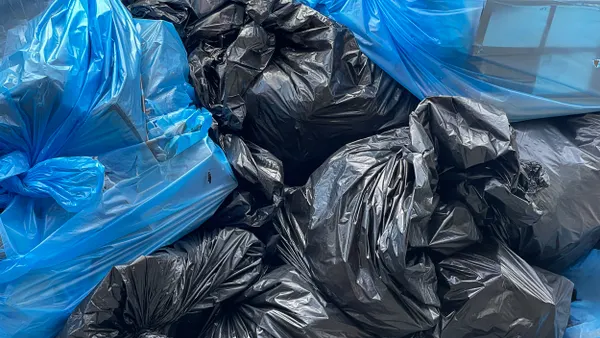Dive Brief:
- Non-profit organization be Waste Wise (bWW) is launching a weekly online interview series called "Pioneers & Changemakers" this week. "Our industry just likes to talk to ourselves instead of others," said co-founder Ranjith Annepu, who said he wants to expand industry conversations by bringing new voices into the mix.
- Starting this week, bWW will host a 30-minute conversation every Wednesday with the opportunity for viewer questions. Robert Egger, founder and president of food recovery organization L.A. Kitchen, will kick off the series Jan. 17 at 9:30 a.m. EST.
- Upcoming guests include Suez UK external affairs director Adam Read, circular economy journalist Maxine Perella, World Bank project manager Renan Poveda, iFixit CEO Kyle Wiens, Kiss + Cathcart architect and Zero Waste Design Guidelines co-author Claire Miflin, and "eco-conscious" blogger Zoe Morrison, among others. Interviews are scheduled through mid-April and bWW is seeking suggestions for future guests.
.@robertegger is a 30 year veteran of social enterprise and empowerment, having founded the @dcck, @campuskitchens & @TheLAKitchen. And we are interviewing him on 17th Jan, 14:30 UTC. https://t.co/722IDDrH0t pic.twitter.com/V8azKcSHdJ
— be Waste Wise (@bewastewise) January 9, 2018
Dive Insight:
Since be Waste Wise was founded in 2013, its main event has been the annual Global Dialogue on Waste. Over the years this concept has taken multiple forms — most recently as a four-day series with more than 20 speakers — and covers a range of waste and recycling topics. Another regular feature is the site's Pioneers List (previously known as the Waste Influencers list) that features 30 individuals, organizations and universities or media outlets (Waste Dive was included on this list in 2017).
Yet the bWW team has come to feel that these annual programs aren't enough to highlight all of the relevant work happening on a global scale. The plan is to use this new series as a way to feature people from the annual Pioneers List while also bringing in new voices.
As interest grows in expanding conversations about circular economy solutions — especially now that global commodity markets have at least temporarily become less favorable — more people see a greater need for dialogue. Opening up to additional voices can help industry professionals break out of the regular binary policy debates, which in turn can generate negative media attention that may color public perceptions.
According to Annepu, no topic is too technical or local, as long as the speaker can focus on the processes and strategies behind their work. By emphasizing that, rather than final results or policy differences, bWW hopes to inspire others working on their own projects. The goal is also to attract more interest in the field from those that may not traditionally see it as inclusive, don't have the time to read through lengthy policy papers or don't have the funding to attend industry conferences.
"They're all looking for solutions and I just feel like the waste industry is not accessible to them," said Annepu. "We're trying to change that."











